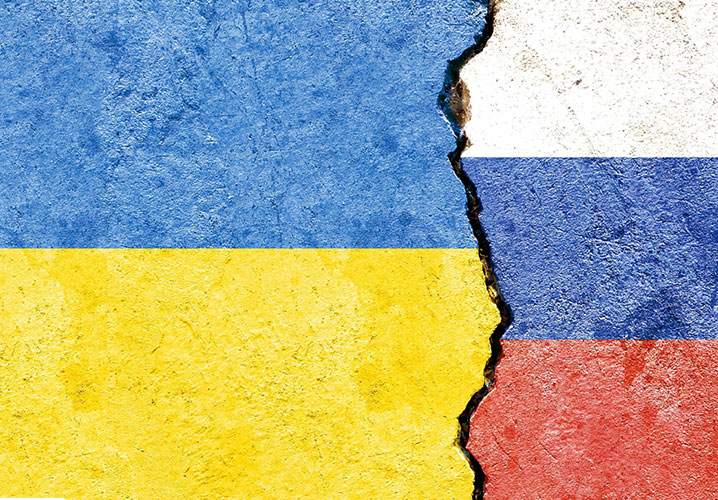
The economic impact of war in Ukraine
Russia has launched a war against Ukraine. The entire country of Ukraine is experiencing heavy fighting and explosions, primarily in major cities. In addition to the humanitarian crisis affecting people worldwide, the war of aggression also has implications for the economy and its insurance cover.
The world is watching the events in Ukraine in horror. Russia ordered military action on 23 February in the night leading up to 24 February, when it invaded its neighbouring country with force. Alongside the human suffering, and the evacuation and displacement of the population, the economy is also affected. Implications for the international stock exchanges and prices of raw materials are expected, and the medium and long-term effects are not yet clear. Existing and future economic sanctions against Russia will have an impact. Sanctions against Belarus are also likely.
Funk is currently examining the implications for insurance cover in individual sectors and will provide more information on this. This article focuses on the implications of sanctions and offers tips on initial steps that companies should take.
The sanctions were imposed by the European Union and the USA and constitute only a first step in a highly dynamic situation. Further measures are possible. The barrage of sanctions threatening to come into force is unprecedented and will have serious effects on the global economy. Russia’s expected response to sanctions is the likely blockade of exports of various raw materials, the banning of aircraft in Russian air space and bans on imports of different goods.
Ukraine: direct implications
The current status of war in Ukraine, a pause or even a scaling-up of hostilities have direct implications for the risk of business interruptions. Business closures are expected and furthermore, transport links like the ports on the Black Sea may be blocked. If supply chains are interrupted, this may lead to business interruption risks for German companies as well. It is especially relevant for companies with offices in Ukraine which directly employ staff members there.
Due to the very dynamic situation, it is not yet possible to draw final conclusions on the implications for insurance cover. Contractually, standardised war clauses may apply, such as those commonly agreed in property, transport and technical insurance policies. In this case, claims would not be covered even though insurance cover is in place. Read more about the implications here.
Russia: indirect impact through sanctions
Here, too, the situation is currently unclear. Insurers are in the process of issuing their own statements. Contractually, sanctions clauses may apply, in which case there is no insurance cover for any risks to companies in Russia.
The sanctions imposed by the EU and further sanctions by the USA essentially aimed at the following targets:
- Financial institutions: Russian banks were banned from the international financial communication system, SWIFT, to cut off the flow of international money to these institutions. Sanctions have also been imposed against the central Bank of Russia, and transactions with several commercial banks have been banned and their assets frozen. What’s more, there are sanctions against trading with Russian government bonds. As a result of these sanctions, legitimate claims payouts can hardly be transferred to Russia any more or adjusted there locally.
Credit insurers have also started to freeze their credit limits in an effort to stop their assumption of risk from rising further. It cannot be ruled out that cover may gradually be reduced in the coming days or even terminated in individual cases, citing war and sanctions clauses. - Transport sector: The EU has imposed a ban on the export of goods, technologies and services for the aviation and aerospace industries. This ban affects many products, above all high-tech goods like microelectronics. Dual-use goods are also targeted. These are products that have both military and civilian uses, like IT or communications technology. In this case, companies must now once again review the classification of their products and components on the sanctions lists more carefully and potentially interpret this more conservatively in order to meet their corporate duty of care.
Furthermore, all Russian aircraft are banned from EU air space. Russia’s national airline, Aeroflot, and private Russian aircraft are also not permitted to land in the United Kingdom. The EU is now considering banning Russian ships from its ports; a decision on this is still pending. - Technology sector: Certain goods and technologies are no longer permitted to be exported to Russia from the EU and other Western countries. These include, among other things, microprocessors or equipment needed for the production of microchips. The USA has also banned the export of high-tech products to Russia.
- Media: Russian state media outlets RT and Sputnik are banned in the EU. The United Kingdom, by contrast, has decided not to take part in this ban.
- Politicians, business people, oligarchs: Assets held by oligarchs in the EU have been frozen, and especially wealthy Russians are being denied the opportunity to obtain European citizenship for themselves and their family members through golden passport schemes. Sanctions against Russian President Vladimir Putin, Foreign Minister Sergey Lavrov and Interior Minister Vladimir Kolokoltsev personally are more symbolic than anything else.
The extent to which companies’ insurance cover is affected depends on the sanctions clauses in the policies and how precisely these are formulated. This is important because the US sanctions are currently tougher than the EU sanctions.
Several insurers have put the inclusion of local policies in international insurance programmes in Russia on hold for the time being or are reviewing this due to the current situation. Reinsurers are also examining reactions that may have implications on the insurance cover of companies in Russia or of their Russian business activities.
1. Deploy crisis and contingency plans
The objective must be to assign clear responsibilities within the company. Depending on how the company is structured, this may involve the Export Control, Legal & Compliance, Purchasing, Sales, Contract Management or Treasury department, for example. The sooner the employees in these departments know what their responsibilities are, the lower the risk of mistakes – sanctions violations – in the near future.
2. Analyse sanctions regulations
If a company is unsure whether individual regulations apply to it, competent advice should be sought. The German Federal Office for Economic Affairs and Export Control provides information on the current situation here. The Deutsche Bundesbank, which is the competent authority for financial sanctions, provides information here. It is crucial to comply with sanctions regulations: violations are punishable with up to ten years in prison and severe fines for executives and export managers.
3. Screen all business contacts for sanctioned individuals
Companies should immediately review all contacts – be those in Purchasing, Sales or other areas of the business. This review is best performed using powerful up-to-date screening software. Companies can also seek information from associations, chambers of industry and commerce, or public sources. The insurer will also conduct regular checks to determine whether existing cover should be terminated due to sanctions clauses. Funk will actively keep clients up to date in this regard.
4. Stop exports, payments and executions of contracts
If a company cannot rule out that its Russian business is affected by new sanctions imposed by the EU or US, it should provisionally stop exports, payments and executions of contracts. Important: extensive sanctions against Russian businesses have been in force since 2014, as well as bans on exports of certain goods (goods list as set forth in Regulation (EU) 2021/821).
5. Review sanctions clauses in contracts
These contracts often provide the right to withdraw from contractual obligations immediately if a business activity would constitute a violation of the new sanctions regulations. Funk is here to support its clients and will review clauses individually.
Stress test provides guidance
With the Funk political risk stress test, you can get an overview of potential risks and prepare for them accordingly.
Once these first steps are initiated, companies should take action to protect their supply chains. The following steps are recommended:
- Review the supplier and customer structure at a company or plant level in Russia and Ukraine
- Communicate more intensively with the affected suppliers and customers in the regions/countries
- Increase the safety stock of relevant supplies to prevent short-term bottlenecks
- Identify potential alternative suppliers not affected by the crisis; ideally there should already be an existing business relationship with these potential suppliers
If you have any further questions, please feel free to reach out to us. Funk is a reliable partner at your side. More information on political risks can also be found in the corresponding ‘Risk fields’ section of our website.
Your contact



